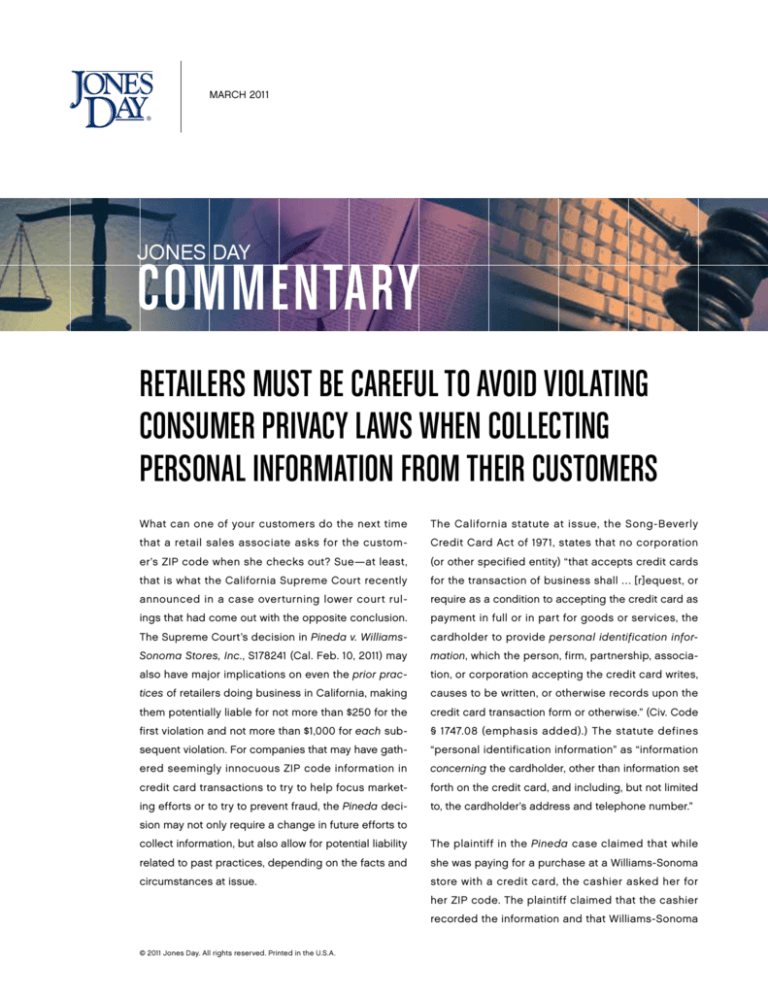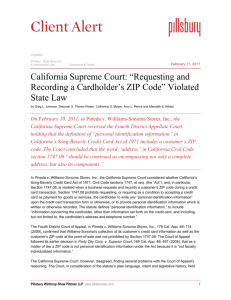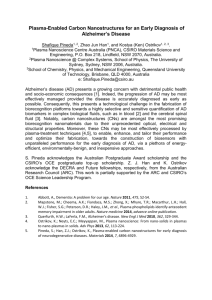
March 2011
JONES DAY
COMMENTARY
Retailers Must Be Careful to Avoid Violating
Consumer Privacy Laws When Collecting
Personal Information From Their Customers
What can one of your customers do the next time
The California statute at issue, the Song-Beverly
that a retail sales associate asks for the custom-
Credit Card Act of 1971, states that no corporation
er’s ZIP code when she checks out? Sue—at least,
(or other specified entity) “that accepts credit cards
that is what the California Supreme Court recently
for the transaction of business shall … [r]equest, or
announced in a case overturning lower court rul-
require as a condition to accepting the credit card as
ings that had come out with the opposite conclusion.
payment in full or in part for goods or services, the
The Supreme Court’s decision in Pineda v. Williams-
cardholder to provide personal identification infor-
Sonoma Stores, Inc., S178241 (Cal. Feb. 10, 2011) may
mation, which the person, firm, partnership, associa-
also have major implications on even the prior prac-
tion, or corporation accepting the credit card writes,
tices of retailers doing business in California, making
causes to be written, or otherwise records upon the
them potentially liable for not more than $250 for the
credit card transaction form or otherwise.” (Civ. Code
first violation and not more than $1,000 for each sub-
§ 1747.08 (emphasis added).) The statute defines
sequent violation. For companies that may have gath-
“personal identification information” as “information
ered seemingly innocuous ZIP code information in
concerning the cardholder, other than information set
credit card transactions to try to help focus market-
forth on the credit card, and including, but not limited
ing efforts or to try to prevent fraud, the Pineda deci-
to, the cardholder’s address and telephone number.”
sion may not only require a change in future efforts to
collect information, but also allow for potential liability
The plaintiff in the Pineda case claimed that while
related to past practices, depending on the facts and
she was paying for a purchase at a Williams-Sonoma
circumstances at issue.
store with a credit card, the cashier asked her for
her ZIP code. The plaintiff claimed that the cashier
recorded the information and that Williams-Sonoma
© 2011 Jones Day. All rights reserved. Printed in the U.S.A.
later used her name and ZIP code to figure out her home
also stated that “it is difficult to see how a single decision
address using “reverse searches from databases that
by an inferior court could provide a basis to depart from the
contain millions of names, e-mail addresses, telephone
assumption of retrospective operation,” retailers accused
numbers, and street addresses, and that are indexed in a
of violating the statute should consider the timing of the
manner resembling a reverse telephone book.” The plain-
alleged conduct and the filing of the complaint, as well as
tiff claimed that software matched her name and ZIP code
the specific allegations regarding the information collected
with a previously undisclosed address, which gave Williams-
because the Court’s language does not necessarily pre-
Sonoma information that it maintains in its own database
clude an argument that a defendant relied on the appellate
used to market products to customers and which informa-
court’s decision during the period between its issuance and
tion may also be sold to other businesses.
the promulgation of Pineda.
The California Supreme Court explained that the issue in the
Although the Pineda decision has led to a flurry of news sto-
Pineda case was “whether [Civil Code] section 1747.08 is vio-
ries and blogging efforts, there are some potential defenses
lated when a business requests and records a customer’s
or exceptions to the statute that retailers should consider
ZIP code during a credit card transaction.” The Court said
even after Pineda. For example, Section 1747.08 itself con-
that the answer to that question was yes: “[i]n light of the
tains some exceptions for permissible uses for collecting
statute’s plain language, protective purpose, and legislative
information, including when a credit card is being used as a
history, we conclude a ZIP code constitutes ‘personal iden-
deposit or for cash advances, when the company accepting
tification information’ as that phrase is used” in the statute.
the card is contractually required to provide the information
“Thus, requesting and recording a cardholder’s ZIP code,
to complete the transaction or is obliged to record the infor-
without more, violates the [statute].” The Court indicated a
mation under federal law or regulation, or when the informa-
cardholder’s address and telephone number, which are
tion is required for a purpose incidental to but related to the
expressly referenced in the statute, constitute information
transaction, such as for shipping, delivery, servicing, installa-
that is “unnecessary to the transaction” and that could be
tion, or for special orders.1 (Civ. Code 1747.08(c).) In addition,
used with other information to locate the customer’s full
a business is not prohibited from “requiring the cardholder
address—either for its own purposes or to sell the informa-
as a condition to accepting the credit card…, to provide rea-
tion to other businesses.
sonable forms of positive identification, which may include
a driver’s license or a California state identification card, or
The Court applied its interpretation of the statute to the
where one of these is not available, another form of photo
defendant’s prior activities despite the fact that Pineda
identification, provided that none of the information con-
overruled a prior appellate court, Party City Corp. v. Supe-
tained thereon is written or recorded....”
rior Court, 169 Cal. App. 4th 497 (2008), that had reached
the opposite conclusion and held that a ZIP code by itself
It is also important to keep in mind the context in which
was not personal identification information under the stat-
the Pineda case arose. Because of the procedural posture
ute, although in a different factual and procedural context.
of the case, the Court accepted as true all of the plaintiff’s
The Court in Pineda explained its decision to apply its inter-
allegations regarding the collection and use of the ZIP
pretation retrospectively despite Party City by noting that,
code information. The ultimate determination of whether
because the alleged conduct and the filing of the complaint
Williams-Sonoma actually violated the statute will depend
predated Party City, the defendant could not have been rely-
on the actual factual record presented to the trial court on
ing on it when engaging in the conduct. Although the Court
that court’s further consideration of the matter. In addition,
1 Additionally, Pineda does not limit Absher v. AutoZone, Inc., 164 Cal.App.4th 332 (2008), in which an appellate court stated that the statutory
prohibition on requiring personal identification information in connection with credit card transactions does not apply to a return that is made in
exchange for a reversal of the original credit card purchase transaction. Finally, Section 1747.08 continues to apply only to credit card transactions, and it does not on its face prohibit a retailer from delaying a request for information until after the method of payment is confirmed to be
cash or check.
2
for those companies facing potential liability with respect to
collecting information from consumers in connection with
past practices in light of Pineda, it is important to keep in
credit card transactions should ensure that there is a busi-
mind that the California Supreme Court indicated that while
ness need for the information and that the collection efforts
the statute states maximum penalties, the amount of penal-
meet an enumerated exception to the statute’s prohibitions.
ties awarded rests with the trial court’s discretion.
Business that inquire whether consumers wish to join mailing lists should also carefully review applicable regulations to
The decision also does not directly address a number of
ensure that they are not inadvertently running afoul of prohi-
interesting follow-on issues, including whether an email
bitions on collecting information. In addition, retailers should
address will be treated as “personal identification informa-
provide an appropriate privacy notice to inform consumers of
tion” under the statute in online transactions. One federal
what information is being collected about them and how the
district court, applying California law, previously held that
retailer will use the information. Retailers should also consider
the same statute does not apply to online transactions,
performing internal audits and implement new policies and
although California state courts and plaintiffs’ lawyers
procedures for ensuring compliance with Pineda. As a best
may try to revisit that issue in light of Pineda. See Saulic v.
practice, we recommend that businesses follow the Gener-
Symatec Corp., 596 F. Supp. 2d 1323 (C.D. Cal. 2009). Addi-
ally Accepted Privacy Principles adopted by The American
tionally, it is unclear whether California’s Pineda decision
Institute of Certified Public Accountants or the Federal Trade
will be a bellwether for decisions in other states with laws
Commission’s Fair Information Practice Principles.
that prohibit retailers from documenting certain consumer
information in connection with credit card transactions,
including Kansas, Massachusetts, New Jersey, New York,
Minnesota, Oregon, Rhode Island, and Wisconsin. Many of
these states’ statutes use the term “personal identification
information,” or a close analogue, and similarly define it as
information concerning a consumer that includes, without
limitation, the consumer’s address and telephone number.
Plaintiffs in such states may attempt to look to parallels in
the statutes and encourage courts in their own jurisdictions to adopt the reasoning behind the Pineda decision.
Accordingly, it remains to be seen whether Pineda is the
first in a wave of new credit card information cases or simply a narrow, California-specific decision on ZIP code information. We can be sure, however, that plaintiffs’ lawyers will
prompt answers to this question. Indeed, one report indicates that more than a dozen new lawsuits were filed in the
first few days following the decision.
Retailers that collect information from consumers in connection with credit card transactions should monitor the future
developments in the Pineda case, which will continue to command significant attention. Retailers that have a practice of
Lawyer Contacts
For further information, please contact your principal Firm
representative or one of the lawyers listed below. General
email messages may be sent using our “Contact Us” form,
which can be found at www.jonesday.com.
J. Todd Kennard
Columbus
+1.614.281.3989
jtkennard@jonesday.com
Kevin D. Lyles
Columbus
+1.614.281.3821
kdlyles@jonesday.com
Colin Leary
San Francisco
+1.415.875.5795
cleary@jonesday.com
Jones Day publications should not be construed as legal advice on any specific facts or circumstances. The contents are intended for general
information purposes only and may not be quoted or referred to in any other publication or proceeding without the prior written consent of the
Firm, to be given or withheld at our discretion. To request reprint permission for any of our publications, please use our “Contact Us” form, which
can be found on our web site at www.jonesday.com. The mailing of this publication is not intended to create, and receipt of it does not constitute,
an attorney-client relationship. The views set forth herein are the personal views of the authors and do not necessarily reflect those of the Firm.






